- Home
- Dandi Daley Mackall
The Secrets of Tree Taylor Page 15
The Secrets of Tree Taylor Read online
Page 15
Donna stood in the doorway a few seconds, watching them. Then she turned to Mom and shook her head. “Boys … they can act like two-year-olds. It’ll be all right. I’ll talk to Bob. Don’t worry. He’ll be fine. Then no more politics!” She stomped out to their car, where Jack and his dad were loaded and ready to go.
“Well, that was fun.” Mom turned to Dad, who’d crept out into the hall. “I’m going to bed, Frank. Are you coming?” It wasn’t a warm invitation.
Dad passed. “Not yet. I’ve got something I want to work on.”
“Another letter to our senators?” Mom sounded like she was accusing him of something, though I couldn’t imagine what. I thought it was great that Dad wrote to our senators. And not just senators. He’d written every president since FDR, sometimes to congratulate them on a vote that helped put people to work on roads and highways or to encourage them to vote no on funding things he didn’t like.
“Get to bed, Tree,” Mom said.
She disappeared before I could argue with her.
Dad headed for his den, but I stopped him. I didn’t care if he was still mad at me. “Dad, what’s it really about? Vietnam? Are we going to war?”
He frowned at me. “War? Yes, I think we’re getting there, Tree. And it’s a war we can’t win. Even if we win it, we won’t be proud of ourselves. It’s not like Germany attacking and taking over the world and us getting in to help our allies. Bob’s right about one thing. It’s tough to quit. And I’d hate to see Communism spread. But this is a civil war, and we’re trying to worm our way in where we don’t belong.”
He changed directions and plopped onto the couch. Mom and Eileen had picked it out, and it was fancy, but not very comfortable. I sat beside Dad. He and I had done a lot of talking on that couch. Only not so much lately.
He slumped, resting his head on the back of the sofa. “I get so tired trying to talk to people who think I’m un-American just because I don’t want to see our boys die over there.”
I hated to think anybody would consider my dad un-American.
He squinted up at our beige ceiling, streaked with shadows from the single light still on. “Do you want to know what the newspaper said on Friday, when four U.S. advisors were killed near Saigon?”
I nodded.
“ ‘Over twenty of the enemy were killed, and our casualties were light today.’ What does that even mean? ‘Light’? I’ll bet it didn’t feel light to those four families. Or to the Vietnamese families, either. And even that tiny report was buried on page thirteen.”
“But why, Dad? Why would we go there if we don’t have to?” I really wanted to know. It had to be important to make my dad fight with his best friend, to keep Jack from even mentioning it to me.
“People are afraid,” he answered at last. “They’re afraid of Communism, especially after finding those missiles in Cuba pointed at us. And there’s no doubt about it, Tree. Communism is nasty business. If Communists ever attack us, I’ll lie about my age and sign up to fight for America.
“Only that’s not what’s going on in Vietnam. The Vietnamese are fighting themselves, and we have no idea who to support. But that doesn’t stop us from sending bombs and weapons. It’ll take decades for that country to recover.” He looked down at me, his face tired and saggy. “I’m afraid you’re going to be hearing more about Vietnam, honey. A lot more.” He got up.
“Are you going to bed?” I wanted him to stay and talk to me longer. It felt like the cold war between us had thawed. Did I have Vietnam to thank for that?
“No. I can’t sleep yet. I need to do something. Talking isn’t getting me anywhere. I can’t get anybody around here to listen—except you, of course.” He almost smiled, but his lips wouldn’t turn up. “So I’m taking a page from your playbook: I’m going to write.”
A stream of warmth shot through me like hot chocolate on a snow day.
Dad had always written—not only letters to politicians but also poems for our birthdays and funny Christmas letters. He was secretary for the American Medical Association in Missouri, and they kept reelecting him because his reports were the only things worth reading in their newsletters.
But he said he was taking a page from my playbook. Like I was the family writer.
After Dad left, Eileen got home from her date and went straight to bed. She’d missed the whole fight. To make things worse, Midge chose to follow Eileen and sleep at the foot of her bed. The traitor.
Any other time, I’d have called Jack to see what he thought about everything. But something kept me from doing that.
I finally dragged myself to bed, where I found another typed note waiting for me. It would have been so great if whatever words I was about to read would answer every question, solve every problem. But I knew better. I unfolded the paper and read:
Nothing weighs on us so heavily as a secret.—Jean de La Fontaine
Now that was the truth. I wondered which of my many secrets Jack was thinking of when he copied the quote. But my brain felt too tired to work it out.
I clicked off my light and crawled between the sheets, but I couldn’t sleep. My mind refused to shut down. It had felt great having Dad talk to me as if we’d never fought. But I couldn’t get over seeing him fight with his best friend.
My thoughts turned to my best friends. Sarah wasn’t mad at me, but she was leaving me anyway. We’d been best school friends our whole lives. And now she’d be in Kansas.
And what about Jack? He wasn’t mad at me, either. But he’d sided with his dad, and I’d sided with mine. What if Vietnam got in the way of our friendship? The thought made me hate that whole country for stirring up things here in Missouri.
And talking with Jack had helped, but it sure hadn’t solved the problem of what would happen to Mrs. Kinney if I wrote the truth about her. Or what would happen to me if I didn’t.
Then there was Penny. I really liked talking with her, but she was so skittish, so secretive.
My mind even traveled to the Lynches and the Quiet House, filled with dragons and pain.
The only bright spot in my whole week had been Ray. So I closed my eyes and pictured Ray and me sitting on the swing, talking and laughing. It wasn’t much to hold on to. But as I lay on my bed alone and in the dark, it was about all I had.
31
Kind-of Friends
When Penny didn’t show up at the pool on Monday, my new worrywart nature set in. The way she’d lit out when she saw Chuck the other day—something hadn’t felt right. I was pretty sure she and Karen weren’t close, either. As far as I knew, Penny didn’t have a single friend … except maybe me.
After I got off work, I went straight to Mrs. Kinney’s. I didn’t plan on asking her any of the questions on my list, and I wasn’t really sure why I wanted to go there. I just did.
“What’s on your mind, Bo Peep?”
We’d settled into our chairs with our nutmeg hot chocolates.
“Bo Peep?”
“Well, you look like you lost your sheep and don’t know where to find them.”
I supposed she was right about that. “I guess I’m still upset about losing Sarah. We’ve been best friends since we were babies, Mrs. Kinney. Her dad sold their farm without even telling her. And Kansas! How can they move to Kansas?”
“That’s a real shame.” She sounded like she meant it, like she understood.
“Did you ever have a best friend?” I asked.
She sighed. “Once. Leastwise, I thought she was a best friend. Seems kind of silly now. But I remember how it was, like the whole world crumbled.”
“What happened?”
She rocked a few times in her rocker before going on. “Arlene. Lived next door. Well, the farm next door, anyways. Didn’t have no kindergarten like you got now. If I got my chores done, I’d walk to Arlene’s, and we’d play. My, we used to laugh. Made mud pies, like the DeShon boys ’cross the street. Jumped in mounds of hay. Or just roamed the hills together.”
“That sounds like fun. Sarah and I used to jump f
rom the barn loft into a giant haystack.” I tried to imagine Mrs. Kinney and Arlene jumping with Sarah and me. It made a funny picture. “What happened to Arlene?”
“School. Come time for fourth grade to start, and Arlene, she changed, I reckon.” Mrs. Kinney stopped, and her gaze went past me and on to something I couldn’t see. “That first day, I sought her out to sit next to, being’s how we always did sit together.” She shook her head. “Arlene acted like she had no idea who I was.”
For a minute, I thought Mrs. Kinney might have forgotten I was there. She kept staring out into space.
I cleared my throat. “That was mean of Arlene.” I wanted to say more. I could see the hurt still there after so many years, fresh enough to make her eyes water.
She shifted in her rocker and brushed imaginary dust from her skirt. “Well, Bo Peep, is Sarah the only one troubling you today?”
I wondered how she knew. I had a whole flock of sheep bothering me, including Mrs. Kinney herself and the article I was supposed to write about her. But Penny was at the top of my “lost sheep” list. “Okay. There’s this girl at the pool.”
“Giving you trouble, is she?”
“No. Not like that. But there is one like that,” I added.
“Wanda.” It wasn’t a question.
“Yeah. But this is a different girl and a different story.”
I noticed the tiny whipped-cream mustache on her lip. I pointed to my lip, and she got the signal and used her napkin.
“So this other gal, she a friend of yours?”
“Kind of, I guess. She’s in my class and comes to the pool. She and her brother and sister have come over to hang out with Jack and me a few times. But I can’t shake the feeling that something’s wrong. Like she’s scared all the time and filled with secrets.”
“This gal got a name?”
“Penny. Penny Atkinson.”
“I know of her. Seen her in the hardware store when I was there with Alfred. At the library, time to time.”
“She said she’d seen you before.” I stopped there and didn’t add the part about how Penny had said Mrs. Kinney did whatever Mr. Kinney wanted. “Thing is, I’m kind of her only friend, and I’m not much of a friend.”
“That must happen to you a good bit, being a kind-of only friend.” She grinned, and I thought she was saying that I was her kind-of only friend.
I smiled back. I couldn’t imagine being her only friend, though. “What about your neighbors, Mrs. Kinney? You’ve got Mrs. Overstreet.” I would have guessed that Mrs. Overstreet dropped by all the time. She sure did at our house. Once, after Mrs. Overstreet’s fourth “emergency” visit to our house that day, Dad explained to Eileen and me that Mrs. Overstreet was a hypochondriac. Eileen happily informed me that meant Mrs. O. only thought she was sick. Mom and Dad were afraid to play croquet after dinner because Mrs. Overstreet might spot them and waddle up for a talk about her latest ailment. Dad believed Mrs. Overstreet would send him to an early grave, while going on to live to be a hundred herself.
Mrs. Kinney sighed. “I don’t think Mrs. Overstreet considers me a friend. She still thinks of me as the little waif in the back row of her eighth-grade English class. She likely remembers how I used to read books during her lectures, instead of listening to her.”
“I’ll bet she’s forgotten all that,” I said.
Mrs. Kinney shook her head. “It doesn’t appear she’s forgotten a lick of it.”
“Then amnesia must be the only ailment she doesn’t suffer from.”
We both chuckled a little.
I tried to think of her other neighbors. Probably not the DeShons. “What about Gary and Mrs. Lynch?”
“Gary? That poor boy. Can’t say I’ve had the pleasure of his acquaintance, though I’ve thought on him quite a bit. On my downest days, I remember that young’un, who can’t never get out and see the world. Oh, not that I’ve seen much more. But I travel in my mind.” There was a glint in her eyes, like a candle being lit.
“My dad said I should think about Gary when I start complaining.”
“And do you?”
“Not enough,” I admitted.
“But you done thought about this Penny?”
“I guess. We talk at the pool. I’ve even talked to Penny about you.”
Her expression flattened. “Have you, now?”
“Just that you and I have been getting to be friends,” I added quickly. “You’d like her. I think she’d like to meet you.” It was just something to say. Penny and I had talked about Mrs. Kinney, but neither of us ever talked about Penny meeting her.
“Can’t imagine why she’d want to meet me,” Mrs. Kinney said. “But I guess I don’t see how it’s a problem if one kind-of friend meets up with another kind-of friend. Bring her by next time. I’ve got plenty of nutmeg.”
As I said goodbye, I was already imagining getting the two quietest people I knew together. And as I walked down the Kinney porch steps, I wondered what I’d gotten myself into.
32
Time Travel
Penny didn’t show up the next day, and I still hadn’t heard from Jack since the Vietnam argument.
Mrs. Lynch surprised us by coming to the pool—without Gary, of course. It was only the second time I’d seen her there. “Hey, Mrs. Lynch!” I called.
“Hello, Tree. My mother’s in town for the day, so I thought I’d take advantage and show my support for my swimming pool.”
“That’s nice of you. How’s Gary?”
She grinned. “Thanks for asking, sweetheart. Did you know my boy will be turning nine on Thursday?”
“Well, tell him happy birthday for me. Are you having a birthday party for him?”
The smile disappeared. “I wish I could. Gary’s condition makes him catch every germ any visitor might carry without even knowing it. But I’ll bake him a cake. And I wouldn’t be surprised if he gets another visit from his Secret Dragon.”
I remembered what Dad said about Gary loving dragons. “He has a Secret Dragon?”
“He does. For about a year now, somebody has been dropping off a dragon every now and then—a toy, a book about dragons, a T-shirt with a dragon on it.”
“Who is it?”
“Wish I knew. I’d like to thank him.” She squinted sideways at me. “Don’t suppose you’ve caught your daddy with a stuffed dragon in his pocket? He’s high on my suspect list.”
“Can’t say as I have.” But it would have been like my dad.
Mrs. Lynch didn’t stay long, but she spent the whole time swimming, not sunning.
I thought about the Secret Dragon. It was kind of nice knowing about a good secret for a change.
That night, before I could change my mind, I called Penny. Someone picked up after the fifth ring.
“Hello?”
“Hi. This is Tree Taylor. Is Penny home?”
“Yeah.”
“Could I talk to her, please?”
“Yeah.” There was the hint of a laugh.
“Is that you, Penny?”
“Yeah.”
Great. Another one-way call. “So I get a chatty conversation, like the last time I called you?”
“Yeah.”
“Thought I’d see you at the pool today.”
“Didn’t feel like swimming,” she said.
“Okay. Well, I had this idea. And you might not feel like doing it, either. But you know Mrs. Kinney, right? I told you I’ve been visiting her. Turns out she’s really nice. But lonely. And I’m the only one who visits her.… Are you still there?”
“Yeah.”
“So I was thinking, maybe you’d like to go see her with me tomorrow? I get off early. We could meet up at the pool. Or at my house. She’d really like to meet you.” That part was a stretch, but I was pretty much talking to myself anyway.
“Yeah. Okay.”
“Yeah? You’ll come? I get off at three. Will that work?”
“Yeah.”
We said goodbye. At least I did. Then I went to
sleep, wondering again what I was getting myself into.
The next day Penny didn’t come to the pool, so I figured she must have finked out on me. But when I got home, she was waiting outside. We walked straight to Mrs. Kinney’s and knocked.
Mrs. Kinney opened the door, wide this time. “Hope you don’t mind hot chocolate in the summertime, Penny,” she said.
She’d dragged out another chair from somewhere, but Penny took the couch. For a few minutes, the only sounds in the room were our slurpings as we drank our hot chocolate.
I tried starting a conversation about swimming. I tried talking about the steam engine show. But I ended up talking to myself.
“So,” I tried again, “guess who I saw at the pool yesterday.”
They didn’t guess.
“Mrs. Lynch. Gary’s mother.”
“Ah,” Penny said.
“That poor young’un,” Mrs. Kinney said.
“She said Gary’s birthday is tomorrow. He can’t even have a party because kids would give him germs. That’s why he can’t go anywhere, either.”
“Now, that’s a real sadness,” Mrs. Kinney declared.
I tried leaning back in my chair, but the chair had no lean to it. “I wish we could do something for Gary. Maybe we could come up with something to give him for his birthday.”
“We could give him books?” Penny ventured.
“Great idea!” I exclaimed, a little overly enthusiastic because she had actually said more than two words. “Only I don’t know how much he can read.”
“Maybe his ma reads to him,” Mrs. Kinney said.
“Right!” I said. “But she works from home. I’m not sure what she does, but Dad says she works all the time when she’s not seeing to Gary.”
“I’ll bet he’s got a good mind,” Mrs. Kinney said.
Now I clammed up because I didn’t know where she was going with that one.
But from the look on Penny’s face, she understood what Mrs. Kinney meant. “You’re right. When all you can do is live inside yourself, your mind has to get big enough to handle it.”
Mrs. Kinney nodded. “Yep. That’s what I’m saying. I go all sorts of places in my own head. I hope that little fella can travel inside his.”

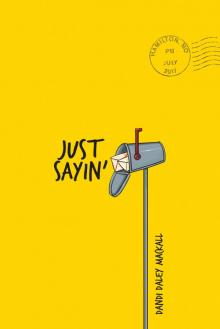 Just Sayin'
Just Sayin' Eager Star
Eager Star Gift Horse
Gift Horse Cowboy Colt
Cowboy Colt Natalie and the Bestest Friend Race
Natalie and the Bestest Friend Race Buckskin Bandit
Buckskin Bandit With Love, Wherever You Are
With Love, Wherever You Are Runaway
Runaway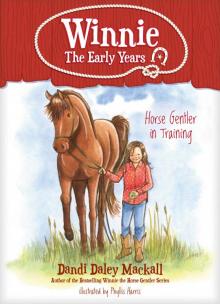 Horse Gentler in Training
Horse Gentler in Training Crazy in Love
Crazy in Love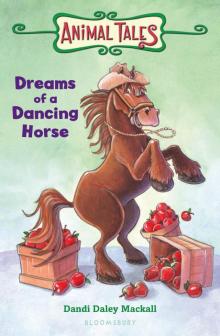 Dreams of a Dancing Horse
Dreams of a Dancing Horse The Silence of Murder
The Silence of Murder The Secrets of Tree Taylor
The Secrets of Tree Taylor Night Mare
Night Mare Natalie Wants a Puppy
Natalie Wants a Puppy Bold Beauty
Bold Beauty Larger-Than-Life Lara
Larger-Than-Life Lara My Boyfriends' Dogs
My Boyfriends' Dogs Dark Horse
Dark Horse Horse Dreams
Horse Dreams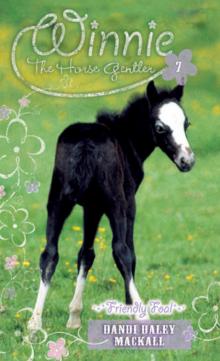 Friendly Foal
Friendly Foal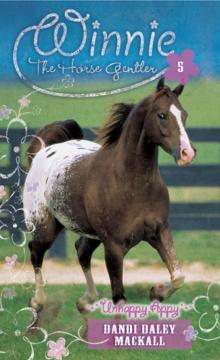 Unhappy Appy
Unhappy Appy Mad Dog
Mad Dog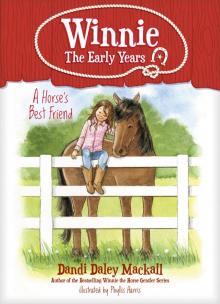 A Horse's Best Friend
A Horse's Best Friend